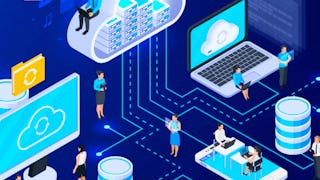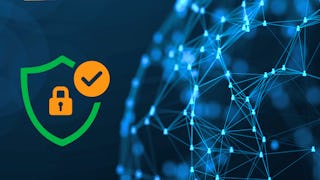GCP: Database, Storage, and Networking is the first course of Exam Prep: Google Cloud Certified Associate Cloud Engineer Specialization. The course provides comprehensive coverage of Virtual Private Cloud (VPC), including VPC creation, firewall rules, VM setup, and VPC peering. Advanced networking topics, such as hybrid cloud integration with Cloud Interconnect and Cloud Load Balancing, are explained with practical examples.



GCP: Database, Storage, and Networking
This course is part of Exam Prep: Google Cloud Certified Associate Cloud Engineer Specialization

Instructor: Whizlabs Instructor
Included with 
Recommended experience
What you'll learn
Manage databases using Cloud SQL, Spanner, BigTable, Datastore, and BigQuery.
Build data pipelines with DataFlow, Dataproc, and Cloud Storage.
Set up and secure VPC networks, firewall rules, VM instances, and VPC peering.
Skills you'll gain
Details to know

Add to your LinkedIn profile
June 2025
4 assignments
See how employees at top companies are mastering in-demand skills

Build your subject-matter expertise
- Learn new concepts from industry experts
- Gain a foundational understanding of a subject or tool
- Develop job-relevant skills with hands-on projects
- Earn a shareable career certificate

There are 2 modules in this course
Welcome to Week 1. This week, we’ll begin with an introduction to Google Cloud Platform (GCP), including a breakdown of its services, regions, and zones, to help you understand how GCP delivers reliable and scalable solutions globally. Moving into GCP's powerful data services, we’ll explore Cloud SQL, its supported database engines, and how to leverage Cloud Spanner, BigTable, and Cloud Datastore for different data needs. Finally, you’ll be introduced to GCP’s robust analytics and data processing tools—BigQuery for large-scale data warehousing, DataFlow for stream and batch data processing, and Dataproc for running Apache Hadoop and Spark jobs. By the end of this module, you’ll have a solid grasp of GCP’s core data services and infrastructure fundamentals, setting the stage for more advanced topics ahead.
What's included
14 videos2 readings2 assignments1 discussion prompt
Welcome to Week 2. This week, we’ll begin by unpacking the core elements of Virtual Private Cloud (VPC), learning how to create VPCs and configure firewall rules to control network access. As we progress, we’ll learn VPC Peering and Cloud Interconnect, laying the groundwork for a hybrid cloud environment. To help you manage complex cloud structures effectively, we’ll introduce the Resource Manager and GCP resource hierarchy, which are essential for organizing and governing cloud assets. We’ll examine the role of IP addressing in cloud networking and round out the week with a deep dive into Cloud Load Balancing and Cloud DNS, both of which are critical for delivering reliable, low-latency applications to users across the globe.
What's included
10 videos2 readings2 assignments
Earn a career certificate
Add this credential to your LinkedIn profile, resume, or CV. Share it on social media and in your performance review.
Instructor

Offered by
Explore more from Cloud Computing
 Status: Free Trial
Status: Free TrialLearnKartS
 Status: Free Trial
Status: Free Trial Status: Free Trial
Status: Free TrialLearnKartS
 Status: Free Trial
Status: Free TrialLearnKartS
Why people choose Coursera for their career





Open new doors with Coursera Plus
Unlimited access to 10,000+ world-class courses, hands-on projects, and job-ready certificate programs - all included in your subscription
Advance your career with an online degree
Earn a degree from world-class universities - 100% online
Join over 3,400 global companies that choose Coursera for Business
Upskill your employees to excel in the digital economy
Frequently asked questions
To access the course materials, assignments and to earn a Certificate, you will need to purchase the Certificate experience when you enroll in a course. You can try a Free Trial instead, or apply for Financial Aid. The course may offer 'Full Course, No Certificate' instead. This option lets you see all course materials, submit required assessments, and get a final grade. This also means that you will not be able to purchase a Certificate experience.
When you enroll in the course, you get access to all of the courses in the Specialization, and you earn a certificate when you complete the work. Your electronic Certificate will be added to your Accomplishments page - from there, you can print your Certificate or add it to your LinkedIn profile.
If you subscribed, you get a 7-day free trial during which you can cancel at no penalty. After that, we don’t give refunds, but you can cancel your subscription at any time. See our full refund policy.
More questions
Financial aid available,

